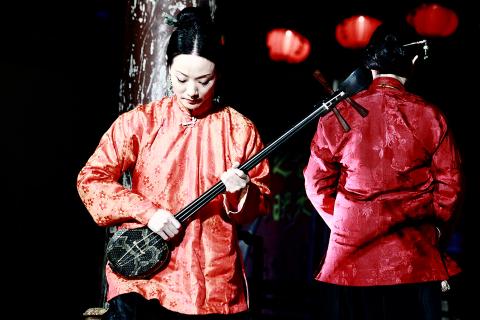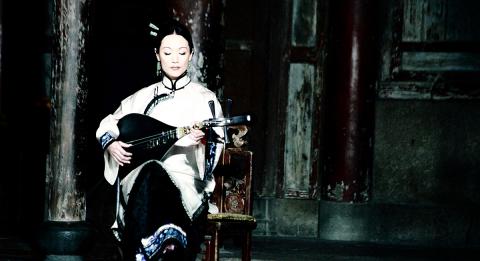Nanguan (南管), an ancient style of Chinese music that has seen a gradual revival over the last couple of decades, is about simplicity — the kind of simplicity that can only be achieved by a lifetime of dedication. Wang Xinxin (王心心), the founder of the Xinxin Nanguan Ensemble (心心南管樂坊), has established herself as one of the foremost exponents of nanguan music on the contemporary scene, and her achievements are being given international scholarly recognition in a concert and lecture tour to Paris, Lisbon and Heidelberg later this week.
The origins of nanguan are lost in the mists of time, but by the end of the first millennium, it was already associated with China’s southern province of Fujian, particularly to the then prosperous port of Quanzhou (泉州). The word nanguan translates as “southern pipes,” and its primary development has been in the form of chamber music, usually a quartet, sometimes with vocal accompaniment. It is particularly known for its extremely slow thematic exposition, a feature that has made it a hard sell to contemporary audiences.
Wang’s love of nanguan’s almost meditative simplicity is at odds with her role as a performing artist in contemporary Taiwan. Nanguan’s roots in amateur musical associations in which musicians performed primarily for their own pleasure have created obstacles for its development as a public entertainment. Taiwan’s Han Tang Yuefu (漢唐樂府), one of the first groups to develop nanguan as a theater event, derives much of its impact from creating lavish visual settings that provide a feast for the eyes when the slow pace of the music leaves audiences floundering.

Photo Courtesy of Xinxin Nanguan Ensemble
Wang, a Quanzhou native and former member of Han Tang Yuefu, established her own company in 2002 to pursue a different vision. Her productions are not without theatrical elements, for as she admitted — with regret — this is the only way nanguan can survive as a performance art in the modern world.
Speaking of the art of nanguan singing, Wang said “the performer should not respond to any of the emotions expressed in the lyrics. Everything is expressed through tone, timbre, and other aspects of musical expression. Every hint of theatricality should be banished. In nanguan, we talk about going to ‘hear’ a show, not to ‘see’ a show. Many people at a nanguan performance may even sit there with their eyes closed, their bodies moving trancelike with the music.”
The stage effects and narrative links in Wang’s shows are intended to provide a doorway into the music.

Photo Courtesy of Xinxin Nanguan Ensemble
“We try to create a meditative atmosphere through our stage settings. In some respects, you might almost say it adds to a performance. It sets the mood for the audience; the visual elements aim to sooth and calm their emotions before the music begins. If they had to get straight into the music, for modern audiences, this would be very difficult,” Wang said.
Wang’s main interests are in fusing nanguan with classic Chinese poetry, adding to the music’s already heavily literary associations, especially with the great romantic tales of Chinese literature (which almost invariably end in tragedy). She is also interested in exploring musical possibilities in combination with other instruments. In the case of her current tour, she has joined together with guqin (古琴) master Huang Chin-hsin (黃勤心). The combination of nanguan music and guqin is a radical departure from tradition, though perhaps not particularly obvious to outsiders.
Wang sees herself very much as an innovator, and sees plenty of potential for innovation from within the Chinese tradition, a refreshing change from the monotonous refrain about East-West fusion that dominates Taiwan’s arts establishment and seems to be the key to government funding.
Still, Wang has not completely escaped the need to conform to contemporary cultural dogma, and has ventured into collaborations with multimedia. As a professional company, the demand for visual stimulation is ineluctable. Costumes, projected backgrounds, stage sets and narrative links have all been included in some of Wang’s shows. “What people don’t always understand is that things that seem simple, such as a group of musicians playing music in a bare performance space, takes years of dedication and also costs money,” she said.
Although Wang has proved reasonably successful in accessing the limited government funds and somewhat more generous corporate sponsorship available, there is a sense of regret that nanguan needs to become such a circus. Wang has established monthly small venue performances at her studio and at the Taipei’s Dadaocheng Theater (大稻埕戲苑), where her stripped down style of nanguan is given a regular airing.
Wang’s unwavering focus on the more abstruse appeal of music over showy oriental exoticism has kept the Xinxin Nanguan Ensemble small, but it has won considerable respect from curators of international arts festivals, particularly in Europe. On her current tour, Wang will speak at the Sorbonne in Paris (Sept. 14) and at the Maison des Cultures du Monde (Sept. 15) about preserving cultural traditions in a contemporary context, and perform at the Orient Museum in Lisbon (Sept. 17), the Musee Guimet in Paris(Sept. 25) and the French Senate House in Paris (Sept. 26).

President William Lai (賴清德) has championed Taiwan as an “AI Island” — an artificial intelligence (AI) hub powering the global tech economy. But without major shifts in talent, funding and strategic direction, this vision risks becoming a static fortress: indispensable, yet immobile and vulnerable. It’s time to reframe Taiwan’s ambition. Time to move from a resource-rich AI island to an AI Armada. Why change metaphors? Because choosing the right metaphor shapes both understanding and strategy. The “AI Island” frames our national ambition as a static fortress that, while valuable, is still vulnerable and reactive. Shifting our metaphor to an “AI Armada”

When Taiwan was battered by storms this summer, the only crumb of comfort I could take was knowing that some advice I’d drafted several weeks earlier had been correct. Regarding the Southern Cross-Island Highway (南橫公路), a spectacular high-elevation route connecting Taiwan’s southwest with the country’s southeast, I’d written: “The precarious existence of this road cannot be overstated; those hoping to drive or ride all the way across should have a backup plan.” As this article was going to press, the middle section of the highway, between Meishankou (梅山口) in Kaohsiung and Siangyang (向陽) in Taitung County, was still closed to outsiders

The older you get, and the more obsessed with your health, the more it feels as if life comes down to numbers: how many more years you can expect; your lean body mass; your percentage of visceral fat; how dense your bones are; how many kilos you can squat; how long you can deadhang; how often you still do it; your levels of LDL and HDL cholesterol; your resting heart rate; your overnight blood oxygen level; how quickly you can run; how many steps you do in a day; how many hours you sleep; how fast you are shrinking; how

“‘Medicine and civilization’ were two of the main themes that the Japanese colonial government repeatedly used to persuade Taiwanese to accept colonization,” wrote academic Liu Shi-yung (劉士永) in a chapter on public health under the Japanese. The new government led by Goto Shimpei viewed Taiwan and the Taiwanese as unsanitary, sources of infection and disease, in need of a civilized hand. Taiwan’s location in the tropics was emphasized, making it an exotic site distant from Japan, requiring the introduction of modern ideas of governance and disease control. The Japanese made great progress in battling disease. Malaria was reduced. Dengue was